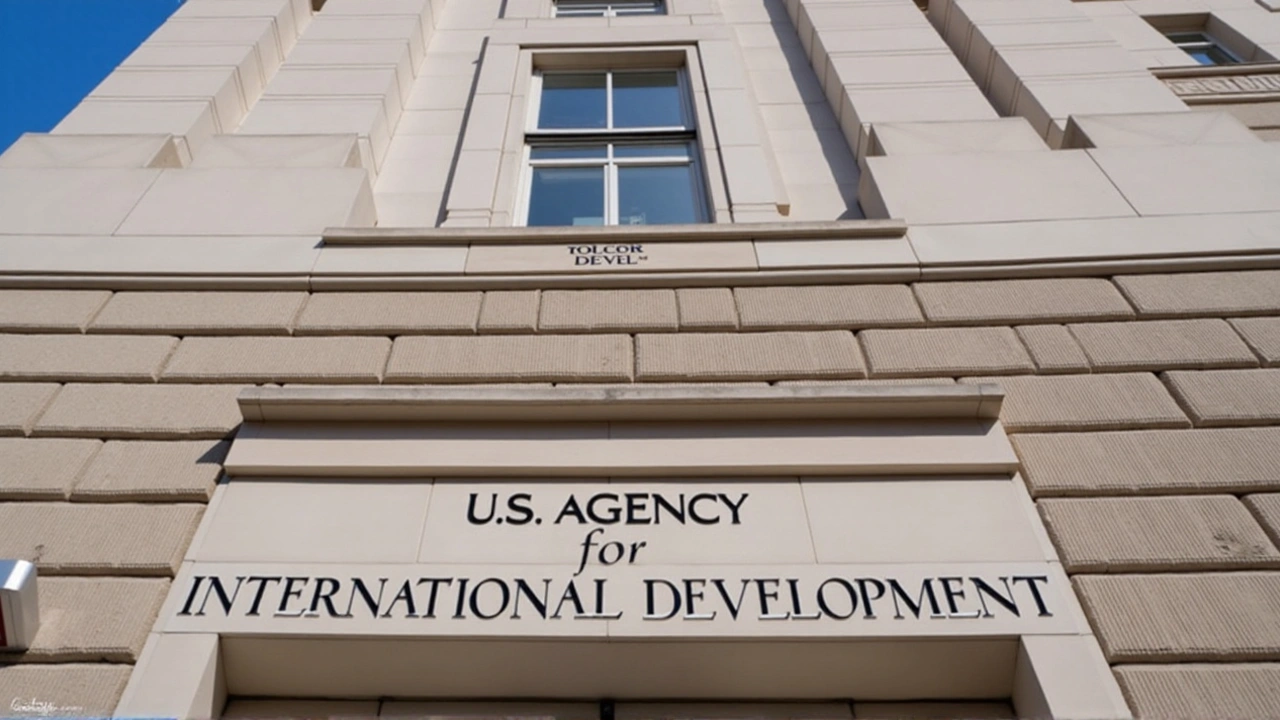USAID Website Mysteriously Offline Amid Political Tensions
The sudden disappearance of the United States Agency for International Development's (USAID) website on February 1, 2025, has intensified a growing political standoff in Washington. President Donald J. Trump's administration, which has frozen foreign aid globally for over a fortnight, has catalyzed concerns among Democratic lawmakers. Many fear this move foreshadows the possible merger of USAID with the Department of State, a shift that could fundamentally alter the landscape of U.S.-led foreign assistance.
USAID has been an independent pillar of American foreign policy since its inception by President John F. Kennedy in 1961. Born out of the necessity to counter Soviet Union influence during the Cold War, its role has evolved to address modern geopolitical challenges. This includes countering China's growing geopolitical sway through its ambitious Belt and Road Initiative, underscoring USAID's significance in contemporary national security strategies. However, the path forward seems jittery amidst the current political chaos.
Murmurs of Change: Fears of USAID Abolition
The backdrop to the website crisis is a more extensive freeze on foreign aid funds, set in motion on January 20, 2025. As a result, significant humanitarian operations have been hampered, leading to furloughs and operational shutdowns across a myriad of international aid projects. Though some life-saving operations continue under the purview of Secretary of State Marco Rubio, widespread uncertainty prevails regarding which initiatives remain active.
Many Congressional Democrats claim that President Trump's motives extend beyond budgetary constraints to a more fundamental restructuring of U.S. aid distribution. The speculation that USAID could be absorbed into the State Department raises not only procedural but legal questions. Democrats argue that any dissolution or significant restructuring of USAID warrants Congressional approval, given its deliberate establishment as a separate entity designed to leverage U.S. soft power - a critical counterbalance to traditionally military-centric strategies.

Political Chess: The Unfolding Drama
Amid this controversy, notable figures have risen to strengthen the discourse on both sides. Democratic Senator Chris Murphy has been particularly vocal, accusing Trump of exploiting executive powers in an unprecedented manner. Murphy's concerns about a 'constitutional crisis' encapsulate fears that the administration is sidestepping the legislative branch to push through sweeping changes.
Additionally, the role of powerful influencers such as Elon Musk, who has long advocated for government downsizing, adds a unique dimension to this debate. Musk's endorsement of dissolving USAID, albeit provocatively phrased through social media, has fanned the flames, encouraging discussions about the balance between executive decision-making and institutional autonomy. His quip, "Live by executive order, die by executive order," encapsulates the tensions of modern governance and its ever-evolving dynamics.
Legal Debates and Financial Considerations
The legality of the administration's actions has been questioned, especially considering past rulings from bodies like the General Accountability Office (GAO). The GAO previously determined that attempts to curtail foreign aid appropriation without Congress under Trump's first term violated the Impoundment Control Act. As the current freeze continues, many anticipate similar rulings that underscore the limits of executive power in foreign aid.
The United States remains the leading donor of global humanitarian aid, allocating less than one percent of its federal budget to such efforts. Critics of the Trump administration's freeze argue that the social, political, and economic returns of this financial commitment far outweigh its costs. Yet, within Republican circles, there exist factions advocating for a leaner federal architecture, where only projects aligning directly with the nation's 'core' interests receive funding.

The Road Ahead: Policy Implications and Global Repercussions
The ongoing 90-day review, spearheaded by Secretary Rubio, aims to critically evaluate which USAID programs align with U.S. national interests. While this review has not explicitly suggested the agency's dissolution, it prompts critical examinations on the efficiency and impact of ongoing international programs. Unfortunately for many aid groups, this period has induced a paralytic effect, causing operational delays and resource strains worldwide.
As this political earthquake echoes, the uncertainties surrounding USAID's future stir anxieties both domestically and internationally. Aid organizations, foreign governments, and affected communities keenly observe how these proceedings may reshape the foreign aid paradigm. For the Trump administration, how it navigates this landscape will significantly impact not just its immediate political fortunes but also the United States' soft power legacy on the global stage.


 Sports
Sports
Heather Stoelting
February 2, 2025 AT 22:00Let's keep pushing forward! The aid freeze hurts millions we need to rally and demand Congress step in!
Travis Cossairt
February 3, 2025 AT 17:20i think the freeze is just a politcal move its mght look strong but the world feels the pain realy.
Amanda Friar
February 4, 2025 AT 12:39Oh great, another budget shuffle. Guess the people who rely on food parcels will now get a nice piece of paper instead of soup.
Sivaprasad Rajana
February 5, 2025 AT 07:59USAID has helped many schools and hospitals abroad. Cutting its funding will close those doors and hurt kids.
Andrew Wilchak
February 6, 2025 AT 03:19Seriously, why not just shut it down already.
Roland Baber
February 6, 2025 AT 22:38Look, I get the frustration with big government, but remember that these programs also build goodwill. When we pull back, we give other countries a chance to fill the gap with their own agendas. That can backfire on us in the long run. So maybe think about a balanced approach rather than an all‑or‑nothing stance.
Phil Wilson
February 7, 2025 AT 17:58The operational continuity of USAID hinges on inter‑agency synergy and fiscal appropriations. A unilateral impoundment violates the statutory framework governing foreign assistance, specifically the Impoundment Control Act. Stakeholders must assess the macro‑strategic implications before enacting any executive order.
Roy Shackelford
February 8, 2025 AT 13:17They want to hide the real agenda behind a veneer of budget cuts. This is how they strip power from the people and hand it to the shadow bureaucracy.
Karthik Nadig
February 9, 2025 AT 08:37Wake up! The freeze is just a puppet show 🎭 and the strings are pulled by unseen hands 🌐👀
Charlotte Hewitt
February 10, 2025 AT 03:57Honestly I think there’s a secret plan to redirect aid money into some covert project. Nothing adds up.
Jane Vasquez
February 10, 2025 AT 23:16Oh wow, what a surprise! Another government “efficiency” move that will magically solve world hunger 😒
Hartwell Moshier
February 11, 2025 AT 18:36Congress should have a say before any agency is merged or shut down.
Jay Bould
February 12, 2025 AT 13:55In many countries we rely on USAID to run vaccination drives. Removing that support could set back public health by years.
Mike Malone
February 13, 2025 AT 09:15From a constitutional perspective, the separation of powers delineates a clear boundary between the executive’s discretion in foreign policy and the legislative branch’s authority over appropriations. Historically, the United States has recognized that foreign assistance operates as an instrument of soft power, complementing hard power strategies. The statutory establishment of USAID in 1961 was intended to create a semi‑autonomous entity capable of long‑term development planning, insulated from the vicissitudes of electoral politics. Recent attempts to unilaterally suspend its operations raise significant questions regarding compliance with the Impoundment Control Act of 1974. Moreover, the precedent set by prior administrations indicates that any substantial reorganization of an agency of this magnitude necessitates congressional oversight. The incumbent administration’s rationale, framed as fiscal prudence, does not address the strategic void that would arise in regions where USAID projects currently serve as stabilizing forces. In sub‑Saharan Africa, for instance, agricultural extension services have reduced food insecurity by measurable margins. In Southeast Asia, health initiatives coordinated by USAID have contributed to the eradication of polio. To discontinue or merge these programs without a comprehensive impact assessment could destabilize fragile states, thereby increasing the likelihood of conflict and migration pressures. Furthermore, the legal arguments advanced by the Office of Management and Budget have yet to be adjudicated by an independent judiciary, leaving the constitutional validity of the freeze in suspense. It is also noteworthy that the global community monitors U.S. aid commitments as a metric of reliability; abrupt policy shifts may erode diplomatic capital. Consequently, legislators, policy analysts, and international partners must engage in a transparent deliberative process. Only through such a process can the nation reconcile its budgetary constraints with its longstanding commitment to global development. In sum, the debate over USAID’s future is not merely a domestic budgetary question but a pivotal moment in the articulation of American values on the world stage.
Pierce Smith
February 14, 2025 AT 04:35While the legal and strategic concerns are well articulated, it is essential that all parties seek common ground and preserve the humanitarian missions that benefit countless lives.
Abhishek Singh
February 14, 2025 AT 23:54Yeah right, we should keep throwing money overseas when our own streets are a mess.
hg gay
February 15, 2025 AT 19:14I hear the frustration of those who see our tax dollars disappearing from foreign aid budgets. At the same time, I feel the anxiety of the families abroad who rely on those programs for clean water and education. It's a painful balancing act when we try to address domestic priorities without abandoning our global responsibilities. We must remember that compassion knows no borders, and that extending a helping hand can create ripple effects that return home in unexpected ways. Listening to both sides of the argument helps us craft policies that are both fiscally responsible and morally sound. I hope we can find a path that honors the dignity of every human being, wherever they live. Let’s keep the conversation respectful and focused on solutions.
Owen Covach
February 16, 2025 AT 14:33USAID shutdown? That’s a wild plot twist in the saga of global aid.
Pauline HERT
February 17, 2025 AT 09:53Our nation should prioritize its own citizens first, any foreign spending must be justified with clear benefits.
Ron Rementilla
February 18, 2025 AT 05:13What mechanisms exist to ensure that freezing aid does not violate international humanitarian obligations?